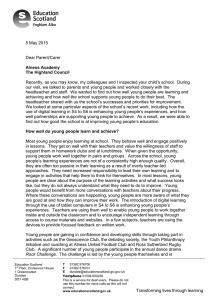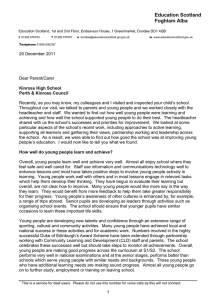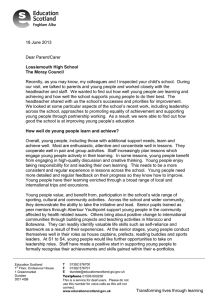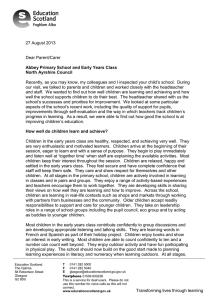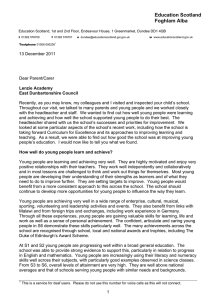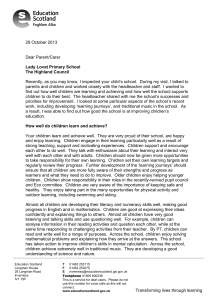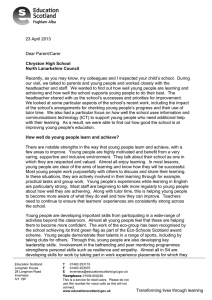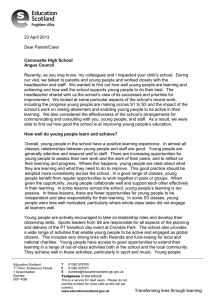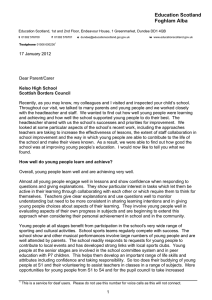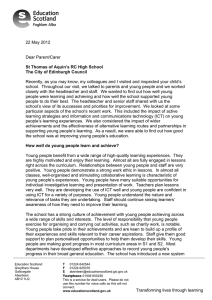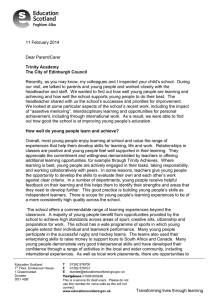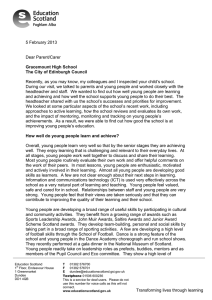11 June 2013 Dear Parent/Carer
advertisement
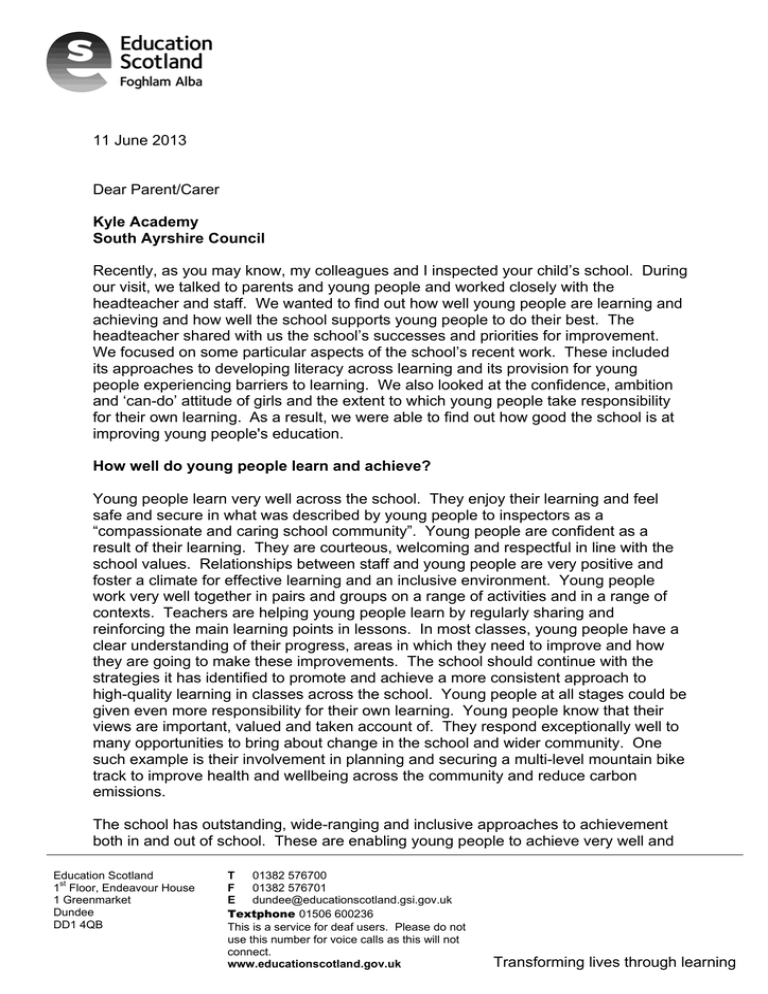
11 June 2013 Dear Parent/Carer Kyle Academy South Ayrshire Council Recently, as you may know, my colleagues and I inspected your child’s school. During our visit, we talked to parents and young people and worked closely with the headteacher and staff. We wanted to find out how well young people are learning and achieving and how well the school supports young people to do their best. The headteacher shared with us the school’s successes and priorities for improvement. We focused on some particular aspects of the school’s recent work. These included its approaches to developing literacy across learning and its provision for young people experiencing barriers to learning. We also looked at the confidence, ambition and ‘can-do’ attitude of girls and the extent to which young people take responsibility for their own learning. As a result, we were able to find out how good the school is at improving young people's education. How well do young people learn and achieve? Young people learn very well across the school. They enjoy their learning and feel safe and secure in what was described by young people to inspectors as a “compassionate and caring school community”. Young people are confident as a result of their learning. They are courteous, welcoming and respectful in line with the school values. Relationships between staff and young people are very positive and foster a climate for effective learning and an inclusive environment. Young people work very well together in pairs and groups on a range of activities and in a range of contexts. Teachers are helping young people learn by regularly sharing and reinforcing the main learning points in lessons. In most classes, young people have a clear understanding of their progress, areas in which they need to improve and how they are going to make these improvements. The school should continue with the strategies it has identified to promote and achieve a more consistent approach to high-quality learning in classes across the school. Young people at all stages could be given even more responsibility for their own learning. Young people know that their views are important, valued and taken account of. They respond exceptionally well to many opportunities to bring about change in the school and wider community. One such example is their involvement in planning and securing a multi-level mountain bike track to improve health and wellbeing across the community and reduce carbon emissions. The school has outstanding, wide-ranging and inclusive approaches to achievement both in and out of school. These are enabling young people to achieve very well and Education Scotland st 1 Floor, Endeavour House 1 Greenmarket Dundee DD1 4QB T 01382 576700 F 01382 576701 E dundee@educationscotland.gsi.gov.uk Textphone 01506 600236 This is a service for deaf users. Please do not use this number for voice calls as this will not connect. www.educationscotland.gov.uk Transforming lives through learning develop important skills and attributes in preparation for a successful life beyond school. Young people are being enabled to consider and evaluate complex environmental, scientific, moral and ethical issues. Through learning and working collaboratively in an extensive range of contexts, including cultural and sporting activities and in the community, young people achieve notable success in local and national competitions and awards. The inclusive ethos ensures that the uptake and completion levels of a wide range of accredited awards are commendably high. Examples include The Duke of Edinburgh’s Award, Saltire Award and the Royal Environmental Health Institute of Scotland (REHIS) food hygiene award. Through a wide range of effective collaborative work the school has achieved a number of awards including two Eco-Schools Scotland green flags and a Cycle Friendly School award. Young people are developing citizenship skills further through a range of ways including Fair Trade, Rights Respecting Schools and charity work. There have been significant improvements in young people’s levels of attainment in recent years, particularly at S4 and S6. The school has successfully improved the achievement of girls from S4 to S6. Young people’s performance in national examinations is now better and, in some measures, is much better than the national average. Its performance is overall better than that of other schools which serve young people with similar needs and backgrounds. Commendably, the school has been successful in narrowing the gap between the lowest- and highest-attaining young people, and in raising attainment overall. How well does the school support young people to develop and learn? Across the school, staff know young people very well and have a strong focus on ensuring individual learners are developing and progressing to the best of their ability. Staff monitor all young people's progress very well and act swiftly to try to ensure that nobody under-achieves. In most lessons, staff provide young people with a broad range of appropriate tasks and activities. In a few lessons, however, staff could expect more of young people, for example, by ensuring that work is consistently and appropriately challenging for each learner. Very effective arrangements are in place to identify and meet the needs of young people who require additional support. Key features include the school’s mentoring programme, extensive opportunities for supported study and very effective approaches to monitoring and tracking young people’s progress. Productive links with partner agencies and the work of the support for learning and the pastoral teams are helping to address young people’s identified needs. Notably the school is working towards Dyslexia Friendly status and this is helping to ensure that the needs of learners with dyslexia are particularly well met. The curriculum is designed to provide all young people with the opportunity to develop skills for learning, life and work whilst achieving to the best of their ability. This is underpinned by a strong focus on the school’s recently revisited values of responsibility, achievement, diversity, respect and ambition. A particular feature worthy of note is the effective way in which planned learning opportunities across and outwith the school build on young people’s skills. Staff plan courses to help young people develop their skills in literacy, numeracy and health and wellbeing across all subjects. The school has made particularly strong progress in promoting literacy across learning. It has engaged partners, including parents, extremely well as it has taken forward improvements in line with Curriculum for Excellence. From S1 to S3, the curriculum is broad and relevant, with appropriate opportunities for young people to 2 specialise in S3 in their chosen areas. Staff across the school are increasingly planning projects which allow young people to link and apply their learning across a range of contexts. Staff should develop these interdisciplinary learning approaches further and extend them across all stages. From S4 to S6, the school provides very good opportunities for young people to progress in a range of qualifications. Young people have the opportunity to study a range of vocational courses. Strong and effective partnerships such as those with Community Learning and Development, The Ark and the police play an important role in continuing to provide innovation and relevance in the curriculum. Staff should continue to work with associated primary schools to develop links across all curricular areas and to ensure that courses at S1 fully meet the needs of all learners. How well does the school improve the quality of its work? Self-evaluation is carried out exceptionally well across the school, and has a clear impact on improvement in all areas of its work. Staff share a common understanding of their collective responsibility and accountability for school improvement. They carry out an extensive range of evaluative activities resulting in a deep, shared and agreed understanding of what works well and where improvement is needed. Staff are highly committed to professional learning and make particularly good use of sharing good practice both within and outside the school to enhance their practice and improve learning and teaching. The school regularly seeks and acts on the views of young people, staff, parents and other partners. The headteacher and depute headteachers provide outstanding leadership and a very clear sense of direction. This empowers and enables staff to demonstrate initiative, develop creativity and take responsibility. Leadership at all other levels is strong resulting in an improving culture of achievement. This inspection of your school found the following key strengths. The strong values demonstrated by young people in their contribution to the life of the school and its community. The compassionate and caring community which the school provides. The breadth and depth of young people’s achievements with significantly improving attainment in national examinations. The extent to which self-evaluation has driven improvement in the school. The outstanding leadership of the headteacher and her senior team in the school and wider community. We discussed with staff and the education authority how they might continue to improve the school. This is what we agreed with them. Continue with strategies to achieve a consistency of high-quality learning experiences across the school. What happens at the end of the inspection? We are satisfied with the overall quality of provision. We are confident that the school’s self-evaluation processes are leading to improvements. As a result, we will make no further evaluative visits in connection with this inspection. During the 3 inspection, we identified aspects of innovative practice which we would like to explore further in order to share the practice with others. As a result we will work with the school and local authority in order to record and share more widely the innovative practice. Marie McAdam HM Inspector Additional inspection evidence, such as details of the quality indicator evaluations, for your school can be found on the Education Scotland website at http://www.educationscotland.gov.uk/inspectionandreview/reports/school/primsec/Kyle AcademySouthAyrshire.asp If you would like to receive this letter in a different format, for example, in a translation please contact the administration team on the above telephone number. If you want to give us feedback or make a complaint about our work, please contact us by telephone on 0141 282 5000, or e-mail: complaints@educationscotland.gsi.gov.uk or write to us addressing your letter to the Complaints Manager, Denholm House, Almondvale Business Park, Livingston EH54 6GA. 4
